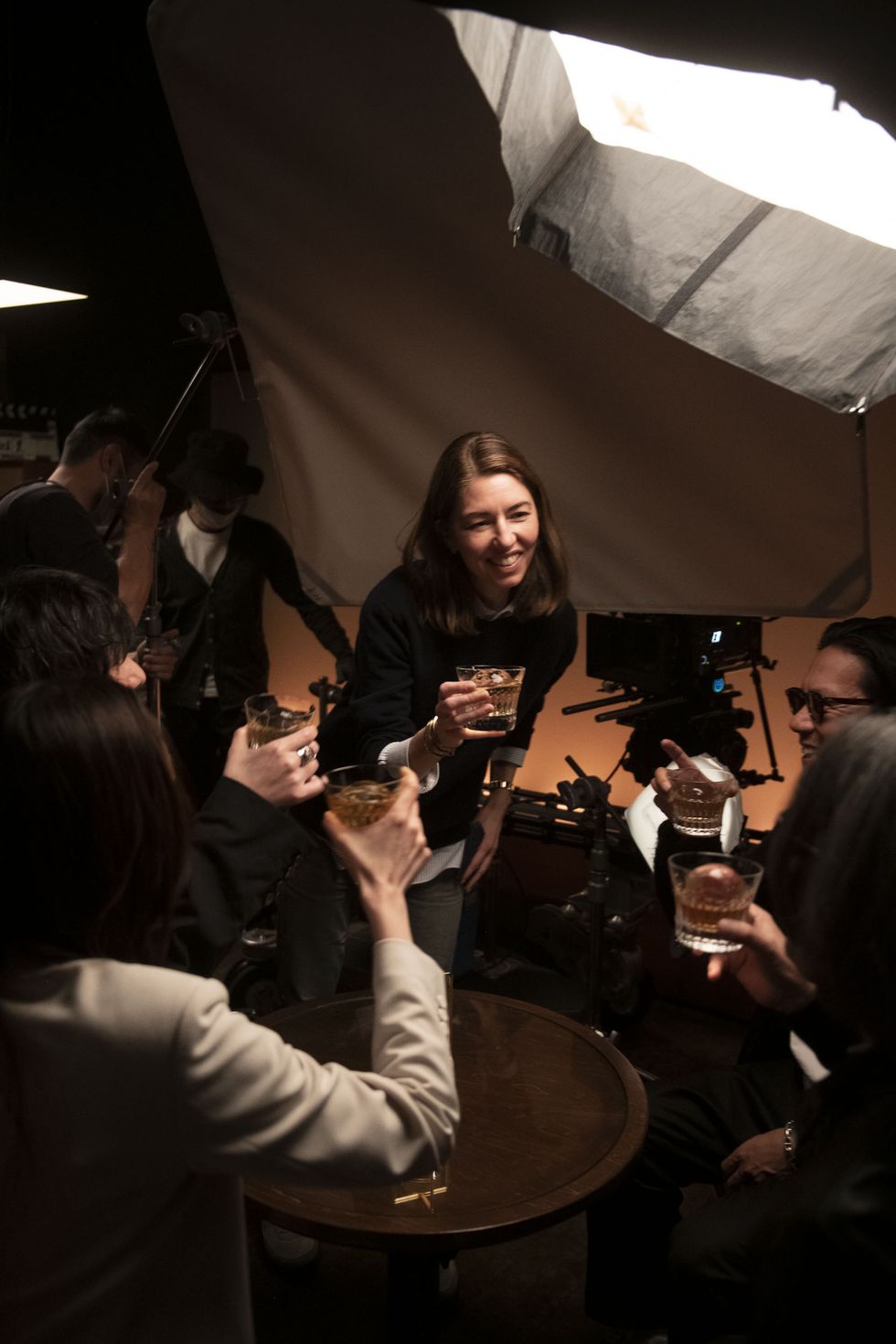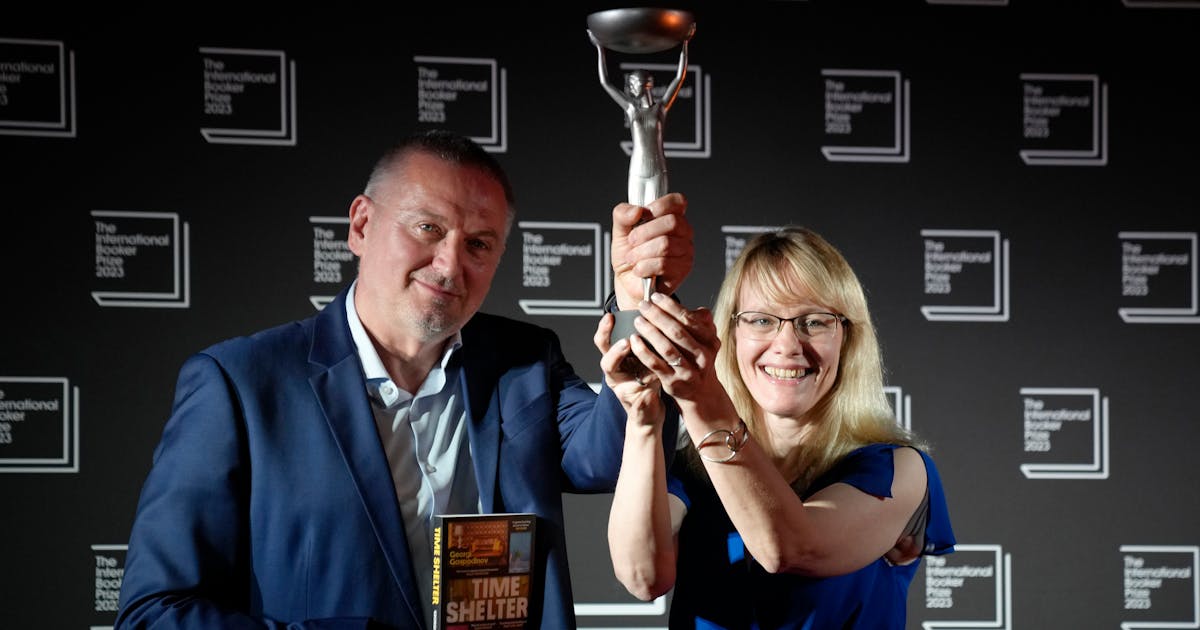Sofia Coppola brings her essence of effortless cool to everything she touches.
The esteemed director is particular about the projects she signs onto, often spending years between films so she can give her all to the production process. When it came time to celebrate Suntory whisky’s 100th anniversary, however, Coppola knew she had to be a part of it.
In honor of the brand’s centennial, Coppola directed a special campaign (starring Keanu Reeves!) looking back at its century of history with a high-speed short film chock-full of nostalgic clips, including vintage Suntory commercials spanning the decades and even self-referential moments from the director’s own archive. 2023 isn’t just the 100th anniversary for Suntory, after all—it also marks 20 years since the release of Lost in Translation, one of Coppola’s career-defining films. She even threw a few Easter eggs into this new project for longtime fans, paying homage to the romantic dramedy, which stars Bill Murray as a movie star in Tokyo to promote Suntory.
Below, Bazaar spoke to Coppola about the conception of the short film for Suntory, reflecting on 20 years of Lost in Translation, and what’s ahead for the director, including her highly anticipated return to the screen with the upcoming Priscilla.
Tokyo has always been a special place for you, and especially in terms of your filmmaking career. What was it like to be back to celebrate 100 years of Suntory whisky? And how does Tokyo as a city continue to inspire you?
It was so great. It was really great to be back—I hadn’t been since the pandemic. And to see my friends that I’ve known since my 20s, spending time in Japan and remembering that it was our 20 years of —I can’t believe it—20 years of Lost in Translation. We used to always say we were gonna have a 16th birthday party for the anniversary, but we haven’t gotten around to it. But it’s always exciting to go back, and I never get jaded to go to Tokyo and Japan in general. I’ve always loved the culture and the country.
This special short for the anniversary has a very big star—Keanu Reeves—who needs no introduction. Why was he perfect for this project?
Suntory has held a pretty long relationship with Keanu over the years. When they said it was their 100th anniversary, I said, “Oh, can we look through all your archives?” My starting point knowing Suntory is from when when I was a little kid, when my dad did a commercial with Akira Kurosawa for Suntory, and that’s where I got the [original] idea when I was writing the script for Lost in Translation—with that memory of them. I asked to look through all the archives, and they had an old commercial with Keanu and different people, and they said that they wanted to do something with Keanu again, because he’s really a sincere fan of the whisky. So, I thought, Perfect! We tried to incorporate something new with all the archive footage.
Like you said, the clip is chock-full of vintage archive footage from past campaigns, commercials, and pop culture moments—even referencing some of your own work. How did you decide which clips you wanted to include in it?
I wanted to show the history of 100 years and all of [Suntory’s] cultural contributions. But I also really just wanted to highlight Japanese culture, not just Suntory, because it is so much about celebrating the culture of Japan. What I love about the clip is that it’s a mix of really modern and classical moments. We tried to show that Suntory has a lot of respect for the nature and origins of where it comes from. I also just wanted to showcase the beauty of Tokyo itself—I’ve always loved like ikebana, and then all the neon signs and [Akihabara], with all the gadgets. Tokyo especially has that real mix of contrasting elements that I love.
Whether it’s a special project like this or one of your full-length films, you’ve always been known for your selections when it comes to soundtracking your work. I love the Joan Jett cover you chose for this one. Tell me why that was the right song. And what does your usual process look like for picking the right song, for the right moment, for any film project?
I mean, I always love that part. It’s always fun to put the music on, and it helps it kind of all come together. We tried some different songs on that one—I love that song, but that cover especially just had a great feeling that kind of pulled it all together and had the energy that we needed it to bring. There’s that energy and the excitement and coolness and fun that encompasses just the energy of being [in Tokyo].
Unbelievably, it’s been 20 years since the release of Lost in Translation. Looking back at the making of the film and first conceptualizing it, how do you think you’ve evolved as a director and as a creative since then?
On that movie, I think I learned really to just go with my instincts and do what I love, because you’re never gonna know what other people are gonna like. You just hope they do! At the time I thought, Is anyone gonna relate to or care about this? And then I was surprised that people did. You just have to hope other people will connect with it too, you know? There’s something about the more specific something is, the more universally people connect to it—I don’t know why that is, but I’ve learned that, I think.
Why do you think it still resonates so much 20 years on?
I don’t know—it was a total surprise to me! But, um, I think the cast was lovable and it feels like you visit Tokyo when you watch the movie. That’s what I always hoped, that it would give you the impression of what it’s like to be there. Everyone has moments of feeling, you know, those kind of surprise connections you have with people. But otherwise, I have no idea except for: It’s nice, there’s Tokyo, and you get to hang out with Bill Murray.
It’s crazy looking back and seeing how young Scarlett Johansson was and now seeing the absolute powerhouse she is today.
I know! She was such a kid.
We’ve spent so much time reflecting on the past and nostalgia, but let’s look forward for a second. You just announced that your first book is coming out later this year, and of course you also have Priscilla coming out. How would you describe and define what’s up next, and what can longtime fans really expect from you creatively in the next few years?
We’re finishing up Priscilla, so I’m just imposed for that. I’m really excited to put that out and I’m excited for my book to come together. We just sent it to the printer! But after that, I’m not sure—I always like to do projects that I connect with personally. [With Priscilla], the cast is really great and we’re in the midst of editing now. I’m excited to see it come together. We had a great shoot, and I’m enjoying working on the music and all those elements, and I hope that people that like my work will enjoy it. I feel like it’s very me.
This interview has been condensed and edited for clarity.
Culture Editor
Bianca Betancourt is the culture editor at HarpersBAZAAR.com, where she covers all things film, TV, music, and more. When she's not writing, she loves impulsively baking a batch of cookies, re-listening to the same early-2000s pop playlist, and stalking Mariah Carey's Twitter feed.







